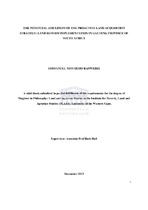The potential and limits of the proactive land acquisition strategy: land reform implementation in Gauteng province of South Africa
Abstract
Land reform in South Africa emerged as one of the important policies for reconciliation, reconstruction and development of the country after years of racial segregation. Its implementation has been three-fold i.e. land restitution, redistribution and tenure reform. The initial sub-programmes of land redistribution i.e. Settlement Land Acquisition Grant (SLAG) and Land Redistribution for Agricultural Development (LRAD) have been confronted with numerous challenges and they have been criticised for influencing group owned projects due to their grant funding models. SLAG required beneficiaries to qualify as households and its failure to date has been largely attributed to unresolved conflicts amongst group members. Under LRAD, although beneficiaries qualified as individuals, the number of grants continued to be challenged by the increasing land prices, and as a result, group-owned projects continued to be created to match the land prices. Both models were demand-driven under the ‘willing buyer, willing seller’ principle. In 2006, government introduced a new model called the Proactive Land Acquisition Strategy (PLAS) which is a ‘supply-driven’ model but operating within the ‘willing buyer, willing seller’ principle. The structural changes introduced in 2010 placed PLAS as the sole land acquisition model under land redistribution. This research investigates the manner in which the implementation of this model assisted to resolve the gaps identified in its predecessors and the reasons thereof. Additionally, the research also investigates characteristics which persisted throughout and why such features persisted. The policy shift from a ‘demand-driven’ to a ‘supply-driven’ model has brought changes in terms of planning, implementation and resource mobilization. To achieve this, the researcher identified three cases where indepth research was conducted, and interviewed key roles placers from the national and provincial departments, and the local municipality. A questionnaire and semi-structures interviews were used to collect the data.

